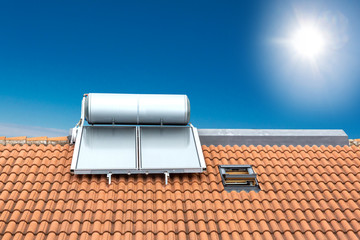
Throughout the earlier years, water heaters were generally black big metal containers warmed numerous hours under the sun. Containers were painted in black given that the color is a good heat conductor. Through the container, the water kept within is likewise heated. Although the procedure is easy, heating water by doing this is undoubtedly time-consuming. With technological development, a quicker and more effective system is established, which is now called a solar water heater.
What You Need to Know
A solar water heater, as the name implies, utilizes the sunshine to warm water. It operates in 2 various types: the active system or the passive system. An active system makes use of an electric pump to flow the heat-transfer fluid, while the passive system has no pump at all.
In an active system, the water heater is even more identified as an open-loop or closed-loop. The main difference in between the two is that an open-loop system (likewise called “direct”) needs a collector to distribute household water while a closed-loop system (likewise called “indirect”) uses a heat-transfer fluid through the collectors and the heat exchanger.
On the other hand, the passive system is categorized into 2 types: the important collector-storage passive systems and the thermosyphon systems. The former type is best suited for locations where temperatures rarely drop below freezing point, while the latter type depends on the natural convection of warm water.
How Does it Work
Have a look at this: when you leave a glass of iced water under the sun for a certain time period, the ice will melt and make a hot glass of water after a while. The same principle applies to a solar water heater, just that it works much faster than that and it has a device called a heat exchanger. The heat exchanger is where the water is warmed by the sun, thus making it a crucial element of the heater device. Other parts consist of pumps, insulated tank, temperature determines, and anti-freeze valves.
The type, size and intricacy of your preferred solar water heater is primarily determined by numerous factors, consisting of the temperature level and quantity of water you need from the unit, as well as the day-night cycle and seasonal changes in temperature level and solar radiation. It’s also important to think about the aspects of fluid getting too hot during the summer season or fluid freezing in the winter season. If the system has actually been designed properly, it can provide at least 40 to 60 percent of warm water requirements throughout the year.
Benefits You Enjoy
The solar water heater is getting appeal mainly due to the fact that they help cut costs and conserve energy. Anybody can set up heating units in their house quickly and in a cost-effective way. The heater also heats water much faster compared to the electrical water heaters. Commercialized electrical heating units consume a lot of power hence increasing electrical power bills. On the reverse side, having a water heater powered by the sun significantly lowers your electrical energy usage.
Because the solar water heater is naturally powered by the sun’s energy, it also proves to be beneficial to the environment. It is thought about to be environment-friendly considering that it does not use gas or other sources to produce heat.
Comments
No comments yet. Be the first to react!